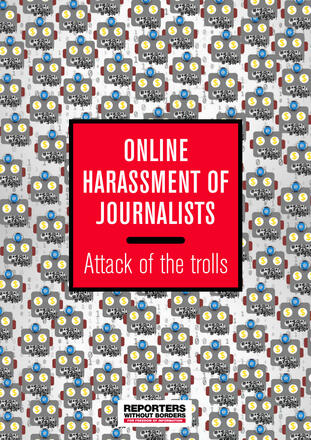
Related contents
The Oxygen of AmplificationCountering Online Abuse of Female Journalists
The cyberspace war: Russian bots and Finnish public debate
The phenomenon of threats and insults, coming from ordinary trolls or from professional ones, to journalists on social networks in order to silence them is spreading throughout the world.
In Mexico, the most dangerous country for journalists among those at peace, “troll gangs” and bots drown journalistic content in fake news and applause for their candidates. Journalist Alberto Escorcia received death threats for shedding light on this system. In India the Hindu nationalist Bharatiya Janata Party (BJP) of Prime Minister Narendra Modi uses troll called “yoddhas” (“fighters” in Hindi) to attack and harass journalists online.
Investigative journalists and women journalists are more likely to be targeted. The psychological effects of the harassment may lead journalists to self-censorship, disconnection from social networks (but it is difficult for journalists to abandon social networks because they have become fundamental in their work) or even to leave the country or change job. Even journalists who have not been victim of attacks are affected, because they also may opt for self-censorship to avoid the risk of being harassed.
Harassment and false information can be spread by bots in synchronized attacks. Posts can appear to be originated by genuine grassroots participants (this technique is called “astroturfing”). There are companies that sell retweets and assist with email bombing. Hate messages tend to be viral, and fake news spread more rapidly than real news. Sometimes a post by an account with many followers is enough to start a mass attack. Insults sometimes follow non-insulting attacks by officials or politicians.
Online harassment of journalists is a problem even in the countries which are best ranked in the World Press Freedom Index. Social network polarization contributes to the problem. Individuals may become trolls because of crowd psychology, but sometimes troll attacks and harassment campaign are organised by companies, terrorist groups or public authorities. Troll armies or paid commentators have been used by some 30 countries, including Russia, China, Turkey, Algeria, Iran, Egypt, Vietnam and Thailand.
RSF makes recommendations to governments, international organizations, online platforms, media organizations and advertisers. The recommendations include strengthening laws authorizing prosecution for online harassment of journalists and the responsibility of online platforms in regard to the content shared on their networks. Journalists should also learn how to deal with troll armies: RSF’s report includes a tutorial.
Tags: Digital safety Social media Defamation and Libel Fake news and disinformation Freedom of expression Journalism education Russia Turkey Middle East Africa Asia Media and gender AmericasThe content of this article can be used according to the terms of Creative Commons: Attribution-NonCommercial 4.0 International (CC BY-NC 4.0) . To do so use the the wording "this article was originally published on the Resource Centre on Media Freedom in Europe" including a direct active link to the original article page.

